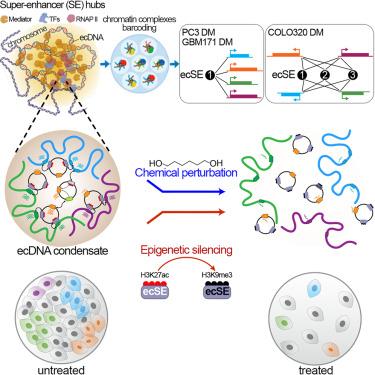染色体外DNA与核凝聚体结合并重组染色质结构以增强致癌转录
IF 44.5
1区 医学
Q1 CELL BIOLOGY
引用次数: 0
摘要
染色体外环状DNA (ecDNA)是癌症基因组中普遍存在的致癌改变,通常与侵袭性肿瘤行为和不良患者预后相关。虽然先前的研究提出了一种基于染色质的移动增强子模型,用于ecdna驱动的肿瘤发生,但其在不同癌症类型中的确切机制和影响尚不清楚。我们的研究利用先进的多组学分析、表观遗传编辑和三种癌症模型的成像方法,揭示了ecDNA枢纽是核凝聚物的一个组成部分,并表现出癌症类型特异性的染色质连接。表观遗传沉默的ecDNA特异性调控模块或化学破坏核凝聚物破坏ecDNA枢纽,取代MED1共激活子结合,抑制致癌转录,并促进细胞死亡。这些发现证实了ecDNA的反式激活子功能,并强调了驱动肿瘤发生的结构机制。这种完善的理解扩展了我们对癌基因调控的看法,并为癌症治疗的替代治疗策略开辟了潜在的途径。本文章由计算机程序翻译,如有差异,请以英文原文为准。

Extrachromosomal DNA associates with nuclear condensates and reorganizes chromatin structures to enhance oncogenic transcription
Extrachromosomal, circular DNA (ecDNA) is a prevalent oncogenic alteration in cancer genomes, often associated with aggressive tumor behavior and poor patient outcome. While previous studies proposed a chromatin-based mobile enhancer model for ecDNA-driven oncogenesis, its precise mechanism and impact remains unclear across diverse cancer types. Our study, utilizing advanced multi-omics profiling, epigenetic editing, and imaging approaches in three cancer models, reveals that ecDNA hubs are an integrated part of nuclear condensates and exhibit cancer-type specific chromatin connectivity. Epigenetic silencing of the ecDNA-specific regulatory modules or chemically disrupting nuclear condensates breaks down ecDNA hubs, displaces MED1 co-activator binding, inhibits oncogenic transcription, and promotes cell death. These findings substantiate the trans-activator function of ecDNA and underscore a structural mechanism driving oncogenesis. This refined understanding expands our views of oncogene regulation and opens potential avenues for alternative therapeutic strategies in cancer treatment.
求助全文
通过发布文献求助,成功后即可免费获取论文全文。
去求助
来源期刊

Cancer Cell
医学-肿瘤学
CiteScore
55.20
自引率
1.20%
发文量
179
审稿时长
4-8 weeks
期刊介绍:
Cancer Cell is a journal that focuses on promoting major advances in cancer research and oncology. The primary criteria for considering manuscripts are as follows:
Major advances: Manuscripts should provide significant advancements in answering important questions related to naturally occurring cancers.
Translational research: The journal welcomes translational research, which involves the application of basic scientific findings to human health and clinical practice.
Clinical investigations: Cancer Cell is interested in publishing clinical investigations that contribute to establishing new paradigms in the treatment, diagnosis, or prevention of cancers.
Insights into cancer biology: The journal values clinical investigations that provide important insights into cancer biology beyond what has been revealed by preclinical studies.
Mechanism-based proof-of-principle studies: Cancer Cell encourages the publication of mechanism-based proof-of-principle clinical studies, which demonstrate the feasibility of a specific therapeutic approach or diagnostic test.
 求助内容:
求助内容: 应助结果提醒方式:
应助结果提醒方式:


